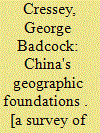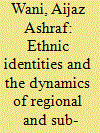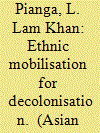|
|
|
Sort Order |
|
|
|
Items / Page
|
|
|
|
|
|
|
| Srl | Item |
| 1 |
ID:
035091


|
|
|
|
|
| Publication |
New York, McGraw Hill Book Co.Ltd., 1934.
|
| Description |
xvii, 436p.hbk
|
|
|
|
|
|
|
|
|
|
|
|
Copies: C:1/I:0,R:0,Q:0
Circulation
| Accession# | Call# | Current Location | Status | Policy | Location |
| 029610 | 951.09/CRE 029610 | Main | On Shelf | General | |
|
|
|
|
| 2 |
ID:
126660


|
|
|
|
|
| Publication |
2013.
|
| Summary/Abstract |
The concept of regional and sub-regional identity as well as regional autonomy has captured the stage of Social Science. The regional autonomy aspirations and the sense of regional and sub-regional identity have offered a new dimension to the assertiveness of ethnic group. Regional identity demands in South and Southeast Asian societies have followed a uniform pattern. These regional autonomy demands evolved over a large span of time may be located in specific geographical and environmental spaces. At one level, these demands remained humane and inclusive, incorporating and reflecting broader human and universal values. At the other level, they acquired the traits of particularism which in the later stages of building multi-cultural and multi-ethnic nation states posed many problems. The plurality of politics is the hallmark of Jammu and Kashmir (J&K) State, and this polarity is essentially the result of cultural diversities that criss-cross the geographical and cultural landscape of Kashmir. The J&K State is not only a conglomerate of three distinct regions - Jammu, Kashmir, and Ladakh - but there are also regions within regions marked off from one another by geography, culture, and history. The politics of regional and sub-regionalism based on region, religion, caste, ethnicity, and so on continues to be stubbornly informed by their respective histories and cultures - thus the resistance against hegemony and the demand for sub-regional autonomies and Hill Development Councils. This article attempts at, looking into the dynamics of these assertions, its impact on the politics of the state, and to delineate the role of different socio-political and historical forces in shaping regional and sub-regional assertions in J&K without, however, suppressing the relative significance of different identity markers.
|
|
|
|
|
|
|
|
|
|
|
|
|
|
|
|
| 3 |
ID:
126661


|
|
|
|
|
| Publication |
2013.
|
| Summary/Abstract |
This article attempts to communicate the methodological tension between subjectivity and objectivity by recording the aspiration of communities who are problematised both by colonialism and the modern nation-state. It highlights how colonial policy and practice contribute to the postcolonial imbroglio in Northeast India. It delineates how British colonial cartography always gave priority to 'administrative convenience' in the demarcation of boundaries, resulting in the division of ethnic community. It argues that Northeast India and the Indo-Burma borderland are not yet decolonised, as the government of India, without any rearrangement or alteration, adopts the colonial administrative boundaries, which divided ethnic communities. Neither the State Reorganisation Act (1956) nor the North-Eastern Areas (Reorganisation) Act (1971) fulfilled the aspiration of the segmented communities in the northeast, as they did in the mainland. The article also argues that the responses of the government of India towards the problems in Northeast India react to the manifested symptoms of the deep-rooted political problem rather than getting to the crux of the problem to find a solution.
|
|
|
|
|
|
|
|
|
|
|
|
|
|
|
|
|
|
|
|
|